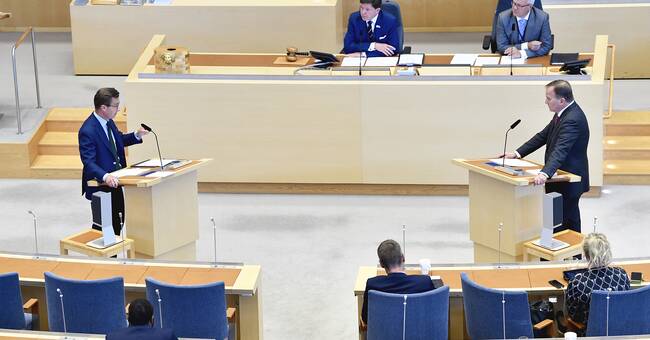Stefan Löfven has previously almost reflexively denied all connections between immigration and crime.
It has emerged from several interviews, including here on SVT.
But the message in today's party leader debate was worded differently.
He was criticized there by, among others, M-leader Ulf Kristersson and SD-leader Jimmie Åkesson for not seeing these connections and then gave a different answer than before.
Learn to be controversial for MP
The Prime Minister said in the Riksdag's rostrum that extensive migration in combination with a lack of integration increases the risk of "the problems we now see".
At the subsequent press conference, he went even further.
There he stated that it is also this conclusion that led the government to change migration policy in a more restrictive direction.
It is a statement that at least within parts of the Social Democrats and definitely within the Green Party is likely to be controversial.
The Green Party is also said to react to Aktuellt's interview with Stefan Löfven, where he clearly states that the Migration Committee's final report will be sent out for consultation in its entirety.
The conflict intensifies
The committee's report will be presented next week and the issue will thus be formally taken over by the government.
A first step is to send out the proposals to a number of different consultative bodies, which will evaluate and review them and then submit comments to the government before the further preparation.
The Green Party, which is strongly critical of most of the proposals in the committee's report, has already demanded that the inquiry not be sent out for consultation in its entirety.
Only the proposals that the Green Party can agree with should be included in the consultation, the party demands.
It is against the background of this demand that the Prime Minister's clear position today is interesting.
This also means that the conflict between the two governing parties can now be sharpened rapidly on this issue.
The Green Party will not quietly accept the Prime Minister's message, unless they have decided to tone down this summer's harsh tone with the threat of leaving the government.
No matter what, migration will be another difficult issue this autumn, both due to the fact that a decision is now approaching and the fact that the parties are so divided in their views on what future migration policy should look like.
Unusually angry tone
Today's party leader debate was also unusually angry in tone, not least from M leader Ulf Kristersson and KD leader Ebba Busch.
In the debate on gang crime, they harshly criticized the government.
The government was portrayed as an obstacle to solving the problems and sharp demands were made on its resignation.
It is, of course, perfectly legitimate for an opposition politician to demand the resignation of the government, but if it is not to be perceived only as empty words and rhetoric, they are normally followed by demands for a declaration of no confidence.
It did not happen.
Which is probably due to the simple fact that parliamentary mathematics has not changed since the election.
In all probability, Löfven would be able to cast a no-confidence vote this time as well.
However, the question is what will happen later this autumn if V leader Jonas Sjöstedt also wants to push for a no-confidence vote due to the government's plans to extend the rules of priority in the Employment Protection Act.
Then the situation can change.

